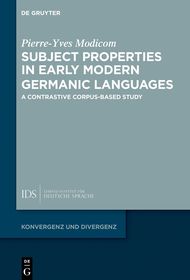
Subject Properties in Early Modern Germanic Languages
A Contrastive Corpus-Based Study
Series: Konvergenz und Divergenz; 13;
- Publisher's listprice EUR 109.95
-
45 601 Ft (43 430 Ft + 5% VAT)
The price is estimated because at the time of ordering we do not know what conversion rates will apply to HUF / product currency when the book arrives. In case HUF is weaker, the price increases slightly, in case HUF is stronger, the price goes lower slightly.
- Discount 20% (cc. 9 120 Ft off)
- Discounted price 36 481 Ft (34 744 Ft + 5% VAT)
Subcribe now and take benefit of a favourable price.
Subscribe
45 601 Ft

Availability
Estimated delivery time: In stock at the publisher, but not at Prospero's office. Delivery time approx. 3-5 weeks.
Not in stock at Prospero.
Why don't you give exact delivery time?
Delivery time is estimated on our previous experiences. We give estimations only, because we order from outside Hungary, and the delivery time mainly depends on how quickly the publisher supplies the book. Faster or slower deliveries both happen, but we do our best to supply as quickly as possible.
Product details:
- Edition number 1
- Publisher De Gruyter
- Date of Publication 21 April 2025
- ISBN 9783111544137
- Binding Hardback
- No. of pages384 pages
- Size 230x153 mm
- Weight 673 g
- Language English
- Illustrations 4 Illustrations, black & white; 7 Tables, black & white 655
Categories
Long description:
This monograph is devoted to the cross-linguistic profile of subjects in Early Modern Germanic languages. The typologically complex question of subject criteria is addressed in a functional framework relying on recent developments in Construction Grammar. The set of data is extracted from a parallel corpus made up of the 1587 German chapbook about the life of Dr. Faustus and its English, Dutch and Danish translations, all of which had been published by 1592. At that time, the syntactic features of English subjects were still comparable to Continental languages like Danish, facilitating the inclusion of English in a cross-Germanic analysis.
The analysis makes use of two comparative concepts of subjecthood; argumental subjecthood, centred on the argument-structural characteristics of subjects, and informational subjecthood, which corresponds to the syntacticization of information-structural properties. Subjecthood is defined as a labile multi-level configuration of argumental and informational parameters. This approach sheds new light on notorious tricks of Germanic syntax such as oblique subjects, expletives, scrambling and subjectless passives.




